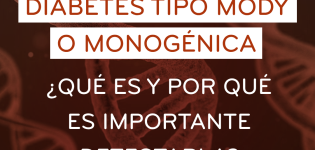If you or a loved one think you have or are struggling with diabetes, don't hesitate to contact us. At barnaclínic+, we can study the process and establish an early diagnosis that allows for early intervention and better treatment. Our team of specialists is ready to offer you the care and support you need.
What is diabetes?
Diabetes is a heterogeneous condition that can present in different forms and with different underlying mechanisms. From autoimmune type 1 diabetes, to type 2 diabetes linked to lifestyle, through to gestational diabetes, MODY diabetes, and other types, each form requires a personalized approach. In all cases, controlling blood glucose levels is essential to prevent complications and preserve quality of life.
Diabetes mellitus is a chronic disease that results from an excess of glucose in the blood (hyperglycemia) due to a disruption in the production or action of insulin.
There are several recognized types of diabetes:
• Type 1 diabetes: an autoimmune disease that requires insulin treatment from the time of diagnosis.
• Type 2 diabetes: the most common form, associated with genetic factors and lifestyle factors such as obesity and physical inactivity.
• Gestational diabetes: appears during pregnancy.
• MODY diabetes: rare forms of genetic origin.
• Other types of diabetes: such as those secondary to pancreatic diseases or associated with certain medications.
How is diabetes diagnosed?
The diagnosis of diabetes is established through blood tests that assess glucose levels and other metabolic parameters. The tests most commonly used are:
Main diagnostic tests
· Fasting glucose
(Diabetes is diagnosed when ≥ 126 mg/dl on two separate occasions).
· Glycated haemoglobin (HbA1c)
(Diabetes is diagnosed when ≥ 6.5%).
· Oral glucose tolerance test (OGTT or “curve”)
(Diabetes if glucose is ≥ 200 mg/dl at 2 hours).
In cases where type 1 diabetes is suspected, especially in young individuals, rapid onset or marked symptoms, it may be necessary to evaluate specific autoantibodies (GAD65, IA-2, ZnT8, insulin), which help distinguish between different types of diabetes.
Normal glucose values
· Fasting: 70–99 mg/dl
· Postprandial (2 hours after OGTT): < 140 mg/dl
Persistently elevated values (especially above 160–180 mg/dl for several days) can cause the three classic symptoms known as the 3 Ps:
Classic symptoms of diabetes
· Polyuria: increased urine output.
· Polydipsia: excessive thirst.
· Unintentional weight loss.
Other frequent symptoms that should alert us
· Constant hunger
· Blurred vision
· Fatigue or tiredness
· Frequent infections (urinary, skin…)
· Slow wound healing
· Irritability or mood changes
· Nausea or general discomfort
Important in type 1 diabetes
We now know that before symptoms appear, type 1 diabetes can be detected through autoantibody screening tests, which identify the disease at very early stages.
→ This enables early diagnosis, prevents onset in ketosis and allows for appropriate follow-up planning.
Can diabetes be prevented?

Preventing type 1 diabetes
We now know that, before clinical onset, type 1 diabetes goes through a silent stage in which autoantibodies appear in the blood even years before the first symptoms. For this reason, at barnaclínic+ we offer serological (autoantibody) and genetic screening to:
· First-degree relatives of people with type 1 diabetes.
· High genetic risk.
· Anyone interested in understanding their individual risk.
This process can be performed at our centre or through a home self-sampling kit, allowing us to identify individuals at high risk long before diagnosis.
We are currently approaching the availability of immunomodulatory therapies capable of delaying disease onset in high-risk individuals. While these strategies continue to advance, at barnaclínic+ we provide guidance on participation in active clinical trials

Preventing type 2 diabetes
There are validated tools that allow us to predict the risk of developing type 2 diabetes without the need for blood testing, such as the FINDRISC questionnaire.
Adopting healthy lifestyle habits and reducing body weight significantly lowers the risk of developing type 2 diabetes.
How is diabetes treated?
The treatment of diabetes depends on the type of diabetes and the specific needs of each patient. At barnaclínic+, we combine the most advanced treatment options with individualized, multidisciplinary follow-up.

Treatment of type 1 diabetes
· Intensive insulin therapy using multiple daily injections (MDI) with insulin pens.
· Continuous subcutaneous insulin infusion (CSII) via insulin pumps or hybrid closed-loop systems.
· Either of the two previous modalities are accompanied by the use of continuous glucose monitoring systems (sensors or CGM).
· Immunotherapy in early stages of the disease.
· Diabetes education focuses on providing the knowledge, skills, and attitudes needed to adapt and improve metabolic control throughout the different stages of diabetes (onset, treatment change, onset of complications, etc.).
· Psychological and nutrition support tailored to the patient's profile.

Treatment of type 2 diabetes
· Medical nutrition therapy and regular physical activity.
· Oral or injectable medications (GLP-1, SGLT2, etc.).
· Insulin therapy with or without continuous glucose monitoring.
· In selected patients, diabetes remission may be achieved through intensive lifestyle changes and sustained weight loss.

Treatment of gestational diabetes
· Strict nutritional and glycemic control.
· Physical activity adapted to pregnancy.
· Insulin in cases that are not controlled by diet alone.
· Coordinated follow-up by a multidisciplinary team including gynecologists and endocrinologists
What happens if diabetes is not controlled?
Maintaining good metabolic control helps prevent the main complications associated with diabetes:
· Cardiovascular diseases (heart, brain and peripheral)
· Diabetic nephropathy (kidney disease)
· Diabetic retinopathy (eye damage)
· Diabetic neuropathy
· Other complications
Proper management involves ongoing follow-up, therapeutic adjustments, emotional support and maintaining normal blood glucose levels over time.
Why treat your diabetes at barnaclínic+?
At barnaclínic+, we offer a comprehensive, precise and personalized approach to the diagnosis and treatment of diabetes, regardless of the type. Our team from the Endocrinology and Nutrition Department of Hospital Clínic de Barcelona provides:

Human and close approach
We support every step of your diabetes treatment process with personalized care, therapeutic education, and tools to improve your quality of life.

Cutting-edge technology
Closed-loop systems (insulin pumps), glucose sensors, connected platforms that allow remote data access Closed-loop systems with remote data access.

Innovation and advanced treatment
We are a leader in research and new therapies for type 1 diabetes, type 2 diabetes, gestational diabetes, MODY diabetes, and other types of diabetes.

Expert multidisciplinary team
Endocrinologists, nutritionists, diabetes educators, clinical psychologists, and exercise specialists work together to address each patient's needs.

In-person, online or mixed monitoring modality
Wherever you live, our team can offer diabetes monitoring options tailored to your needs.

Diagnosis and monitoring in one place
Analysis, consultation, therapeutic planning and progress monitoring without travel.
Take control of your diabetes, with the support of professionals at the Hospital Clínic de Barcelona.
Trust a team of experts in diagnosis, treatment, and personalized follow-up.
EXPERT TEAM IN DIABETES
Preguntas frecuentes sobre diabetes
How do I know if I have diabetes?
Through a blood glucose or glycosylated hemoglobin test.
What can I eat if I have diabetes?
A balanced diet planned by specialists in medical-nutritional therapy for diabetes.
Is diabetes hereditary?
All types of diabetes have a genetic component. MODY diabetes is inherited in a traditional manner, and type 2 and type 1 diabetes inherit the risk of these conditions.
What is normal blood sugar level?
Between 70 and 99 mg/dl on an empty stomach. These are considered normal blood sugar levels.
Can type 2 diabetes disappear?
Yes, some patients achieve sustained remission with intensive changes.
What is the latest technology for the treatment of type 1 diabetes?
The latest technology for monitoring your blood sugar, at your fingertips. Closed-loop systems (insulin pumps), sensors, connected platforms, and specialized treatment.
DIABETES BLOG

Claves y avances e investigación en diabetes en 2024
El manejo de la diabetes ha avanzado notablemente en los últimos años gracias a investigaciones innovadoras y a la incorporación de nuevas tecnologías. En este sentido, el año 2024 ha estado lleno de novedades y el Dr. Jesús Blanco, especialista en Endocrinología y Nutrición de barnaclínic+ y del Hospital Clínic de Barcelona llevó a cabo […] La entrada Claves y avances e investigación en diabetes en 2024 aparece primero en Blog de Enfermedades Digestivas y Metabólicas.

Diabetes tipo MODY o diabetes monogénica: qué es, cómo detectarla y la importancia de un diagnóstico preciso
La organización del congreso anual de la Sociedad Española de Endocrinología y Nutrición me invitó el pasado 17 de octubre a dar una conferencia sobre el diagnóstico de las diabetes monogénicas, también conocidas como diabetes tipo MODY. Fue una oportunidad magnífica para compartir con el resto de los compañeros de la sociedad nuestra experiencia como […] La entrada Diabetes tipo MODY o diabetes monogénica: qué es, cómo detectarla y la importancia de un diagnóstico preciso aparece primero en Blog de Enfermedades Digestivas y Metabólicas.

¿Se cura la diabetes tipo 1? ¿Han conseguido por primera vez una cura para la diabetes en China?
En las últimas semanas, diversos medios de comunicación han difundido ampliamente las últimas noticias sobre la cura de la diabetes tipo 1 en China, relacionada con un tratamiento basado en células madre. Aseguran que este avance podría significar el fin de este tipo diabetes que afecta a millones de personas en el mundo. Sin embargo, […] La entrada ¿Se cura la diabetes tipo 1? ¿Han conseguido por primera vez una cura para la diabetes en China? aparece primero en Blog de Enfermedades Digestivas y Metabólicas.








